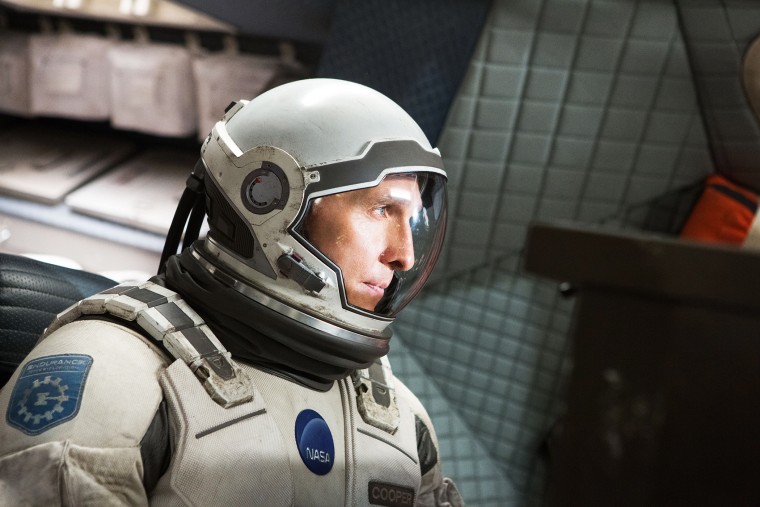Lost amid the debate over whether Christopher Nolan's latest blockbuster "Interstellar" is any good, or scientifically sound, is the fact that it is yet another big-budget spectacle that presents catastrophic climate change as the new normal.
The film, which opened Nov. 5, presents a future where the Earth is running short on food because imposing dust clouds are enveloping the planet. Nolan's film doesn't overtly suggest the calamity is man-made, but its ambitious plot largely revolves around humanity seeking a new, livable atmosphere for the human race.
Related: Ocean and land temperatures in October were highest on record
“The film feeds off certain concerns that are very valid in the world today. But really it’s about saying what is mankind’s place in the universe?” said Nolan in a recent interview with The Guardian. “I think it’s very exciting to deal with that dramatically and I think it’s important we have to deal with that out of necessity. In real life, it would be far better if we dealt with that issue out of choice.”
Oscar winner Matthew McConaughey plays the pilot of a super-secret NASA mission to explore distant planets to determine whether they can revive the species. In Nolan's alternate universe, in rhetoric that is reminiscent of climate change deniers who believe global warming is a myth, the legendary Apollo moon missions are dismissed as elaborate hoaxes and the space program has been reduced to going underground.
“This world's a tragedy,” intones McConaughey's character in the trailer. “It's been telling us to leave for a while now.”
Although some segments of American society (including some congressional Republicans) still refuse to perceive climate change as a reality, the Hollywood community clearly does. The success of Al Gore’s 2006 documentary film “An Inconvenient Truth”, which seemed like an outlier at first, may have actually heralded the beginning of both a heightened political and social awareness of global warming, and “Interstellar” represents a natural progression.
Related: 'Morning Joe' attends the 'Interstellar' premiere
Our cinema is no longer attempting to convince us that climate change exists, it’s now warning us of what will happen if we don’t take the steps necessary to curb it. Today, according to the Pew Research Center, more Americans (roughly 6 in 10) believe in climate change than ever before – yet they don’t see it as a top priority. Certainly, President Obama’s recent landmark agreement with China to reduce carbon emissions will raise the issue’s profile in the public consciousness.
The script for "Interstellar" has been widely criticized for taking on more larger-than-life themes than it can handle, so it’s not surprising that the film is not a single-minded, left-wing screed. And yet, it is arguably part of a genre which has been dubbed "cli-fi"-- films which predict an inevitable environmental fallout and desperate fight for survival.
Disaster films have been a part of Hollywood's DNA for decades, but in the last few years alone eco-disasters have supplanted threats from abroad as an antagonist in action films like "The Day After Tomorrow," and even beloved kids' films like "Happy Feet" and "Wall-E".
Actor Michael Caine, who plays a supporting role in "Interstellar," admitted to The Guardian that making the movie caused him to rethink his own views on climate change.
“When I went to do this movie in L.A. two years ago I left on October 2nd. It was 86 degrees here and when I got to Los Angeles it was pouring with rain. That is the exact opposite of what it’s supposed to be. That worried me. I’d never believed in global warming and I went: ‘Whoops. Maybe there is something in it.’”
The somewhat progressive bent of "Interstellar" is something of a departure for Nolan, who has been perceived as a conservative based on his past hit films. For his part, Nolan has always cautioned viewers from reading too much into his films' political subtext. "To be perfectly honest, we really try to resist, at the script stage, being drawn into specific themes, specific messages," Nolan told The Washington Examiner during the rollout of “The Dark Knight Rises.” "Really, these films are about entertainment; really, they are about story and character. But what we do is we try and be very sincere in the things that frighten us or motivate us or would worry us when you're looking at, 'Okay, what's the threat to the civilization that we take for granted?'"
Perhaps an evocative film like “Interstellar,” with its doomsday scenario, high stakes and time-traversing plot, could also create a renewed sense of urgency about the threats posed by climate change.
